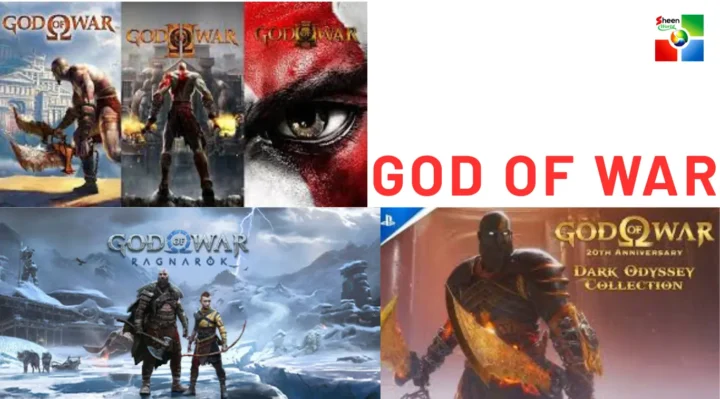At a Glance God Of War

The God of War series is one of the most iconic franchises in the world of video games. Combining mythological storytelling, cinematic visuals, and groundbreaking gameplay mechanics, this series has captivated millions of players across the globe. From its debut on the PlayStation 2 in 2005 to its modern reimagining on the PlayStation 4 and beyond, God of War has continuously evolved while retaining its brutal, visceral essence.
This in-depth article will explore the history, gameplay, mythology, character arcs, critical reception, and future of the God of War franchise. Whether you’re a long-time fan or someone curious about the hype, this ultimate guide has everything you need to know.
H2: The Origins of God of War
The God of War franchise was first developed by Santa Monica Studio and published by Sony Computer Entertainment. Directed by David Jaffe, the original game launched in 2005 and immediately became a critical and commercial success.
H3: Early Development and Vision
The developers wanted to create a game that stood apart from traditional hack-and-slash titles. Inspired by Greek mythology, God of War introduced a protagonist who wasn’t a traditional hero but a deeply flawed warrior seeking redemption.
H3: The Birth of Kratos
At the heart of the series is Kratos, a Spartan warrior marked by tragedy, rage, and vengeance. Unlike typical protagonists, Kratos was designed as an anti-hero — a man consumed by grief after being tricked into killing his own family by Ares, the original God of War in Greek mythology.
H3: The Original Gameplay Mechanics
The original God of War game featured groundbreaking mechanics, such as quick time events (QTEs), cinematic boss battles, and the legendary Blades of Chaos — chained weapons that became synonymous with Kratos himself.
H2: The Evolution of the God of War Series
The series has undergone several transformations over the years, both in gameplay and narrative scope.
H3: The Greek Saga (2005–2013)
The first era of God of War focused on Greek mythology, spanning multiple consoles.
H4: God of War (2005)
Kratos’ journey of vengeance against Ares set the tone for the series. With stunning visuals for its time, brutal combat, and a dark story, the game quickly gained a cult following.
H4: God of War II (2007)
Building on the first, this sequel delivered even bigger battles, deeper mechanics, and jaw-dropping boss fights against titans and gods like Zeus.
H4: God of War III (2010)
The epic conclusion to the Greek saga brought Kratos face to face with Zeus in a climactic battle. With PlayStation 3’s hardware, God of War III showcased cinematic visuals that were groundbreaking at the time.
H4: Spin-Offs and Prequels
Titles like Chains of Olympus (PSP), Ghost of Sparta (PSP), and Ascension (PS3) expanded Kratos’ backstory and added new gameplay twists.
H3: The Norse Saga (2018–Present)
In 2018, Santa Monica Studio reinvented God of War with a soft reboot set in Norse mythology.
H4: God of War (2018)
This installment introduced a more mature, reflective Kratos, now living in Midgard with his son Atreus. The shift from Greek to Norse mythology revitalized the franchise, blending emotional storytelling with breathtaking visuals and revamped gameplay.
H4: God of War Ragnarök (2022)
The sequel continued Kratos and Atreus’ journey, delving deeper into the Norse mythos while delivering some of the most emotional storytelling in gaming history.
H2: Core Gameplay Features of God of War
H3: Combat Mechanics
The God of War franchise is renowned for its brutal combat. From the Blades of Chaos to the Leviathan Axe, players wield legendary weapons that combine fluid combos with devastating finishers.
H3: Puzzle Solving and Exploration
Unlike many action titles, God of War also emphasizes environmental puzzles, platforming, and exploration, adding layers of depth to gameplay.
H3: Cinematic Storytelling
The series revolutionized storytelling in games by blending gameplay seamlessly with cinematic cutscenes. Every installment feels like a living myth.
H2: The Mythology Behind God of War
H3: Greek Mythology
The Greek saga drew heavily from mythology, featuring characters like Zeus, Athena, Hades, and Hercules. However, the series added its own creative twists, making these myths feel fresh.
H3: Norse Mythology
The Norse saga introduced figures like Baldur, Freya, Thor, Odin, and the looming threat of Ragnarök. These gods were reimagined in darker, grittier ways than their traditional depictions.
H2: Kratos – The Icon of God of War
Kratos isn’t just a protagonist; he’s a cultural icon in gaming.
H3: The Anti-Hero of Greek Mythology
In the Greek saga, Kratos was defined by rage and vengeance. He slaughtered gods and titans alike in his quest for revenge.
H3: The Father in Norse Mythology
In the Norse era, Kratos evolves into a father figure, trying to guide Atreus while grappling with his violent past. This transformation has been praised as one of the most compelling character arcs in video game history.
H2: God of War’s Impact on the Gaming Industry
H3: Innovations in Gameplay
The series popularized QTEs, cinematic boss battles, and immersive storytelling.
H3: Influence on Other Games
Many modern action titles, from Devil May Cry to Elden Ring, owe some inspiration to the mechanics and storytelling of God of War.
H3: Awards and Critical Acclaim
Both the original trilogy and the 2018 reboot received countless Game of the Year awards, cementing the franchise as a benchmark for excellence.
H2: Cultural Significance of God of War
H3: A Global Phenomenon
From fan art and cosplay to novels and merchandise, God of War has become more than just a game — it’s a cultural movement.
H3: The Evolution of Video Game Storytelling
By blending myth, emotion, and brutality, the series helped prove that video games can deliver stories on par with movies and literature.
H2: What’s Next for God of War?
H3: Possible Future Settings
Speculation abounds that the series may one day explore other mythologies, such as Egyptian or Japanese lore.
H3: Kratos’ Legacy
As the franchise evolves, Kratos’ story may conclude, paving the way for Atreus or a new protagonist.
H2: Frequently Asked Questions About God of War
H3: Is God of War based on real mythology?
Yes, but with creative liberties. While rooted in Greek and Norse myths, the games reimagine these tales with unique twists.
H3: Can I play God of War on PC?
Yes, God of War (2018) was officially released on PC in 2022, expanding its audience.
H3: Do I need to play earlier games before God of War (2018)?
Not necessarily. The 2018 game works as a soft reboot, though knowledge of the Greek saga enriches the experience.
H2: Conclusion
The God of War franchise is more than just a series of action games; it’s a masterpiece of storytelling, mythological reinterpretation, and gameplay innovation. From Kratos’ rage-fueled battles in ancient Greece to his heartfelt journey through the Norse realms, God of War remains one of the most celebrated and influential franchises in gaming history.
With its continued success and potential future expansions, the saga of Kratos and Atreus promises to enthrall gamers for years to come.



